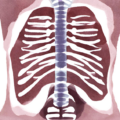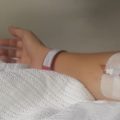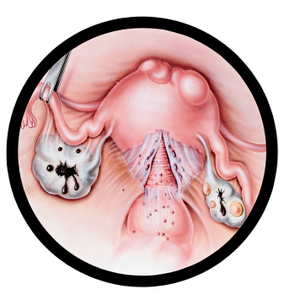I probably have endometriosis, but there’s only one real way to be sure: a laparoscopy. In a few weeks, I will undergo this minor surgical procedure and finally get a diagnosis for the disease I most likely have.
The symptoms started in late November: a strong gnawing pain in my lower right abdomen that worsened over a week. I could stand up, but not walk normally. When I went to my primary care doctor, he sent me to the ER. There, they performed a CT scan and a trans-vaginal ultrasound. All they found was excess fluid. “It’s a ruptured ovarian cyst,” the ER doc said. “It’s very common in women in their mid- to late twenties. Just rest for three days, take some NSAIDs, and see your gynecologist.”
My gyno did a pelvic exam and found that I was tender and sore over my right ovary and in terrible pain when he pressed on my left ovary. Not only that, but the ligaments near the back of my uterus were tender too. He asked me a very long list of questions that I was surprised to hear. “Have your periods been getting more painful? Has intercourse become more painful? What has your menstrual health looked like over the past six months? Has anyone in your family been diagnosed with endometriosis?”
I answered that my periods had recently become irregular and more painful, but nothing too unusual. I thought that intercourse had been normal, but my partner chipped in: “No, actually, there have been times when intercourse has been very painful for you.” I had simply dismissed it as I’d read that hormonal fluctuations are normal as you near 30, and that your periods generally become heavier and sometimes more painful. My gyno told me that this is called “normalizing behavior”: because something out of the ordinary doesn’t strike us as a medical problem, we simply dismiss it and forget it even happened, much less associate it with illness. Also, members of my family did have endometriosis.
He told me I’d have to have a CT scan done to check for ovarian cysts, and that we had to rule out polycystic ovarian syndrome and pelvic inflammatory disease, but it was likely I’d developed endometriosis later than usual. He prescribed a course of progestin to reduce the swelling of the scar tissue and adhesions and then told me to start extended-cycle birth control (where you only menstruate every three months).
I was hoping to have a quick diagnosis and be back to normal in a few weeks, but it turned out to be anything but short and simple to find a diagnosis and a treatment plan.
Progestin was very hard on me physically and emotionally. I vomited constantly, even waking up in the middle of the night to do so. I grew a stringy white beard and a brown mustache (these fell out when I stopped the medication). I found myself sobbing at cat food commercials and songs I previously enjoyed. I started feeling very cold and very warm at random intervals, and thought that my partner was messing with the thermostat. These, apparently, are the joys of hot flashes. I got vertigo and found myself stumbling dizzily to the kitchen or bathroom. With each dose, I became more emotionally weird. It was a short course of hormone replacement therapy, and it did in fact reduce the pelvic pain, but I’m terrified to ever experience that kind of emotional instability again.
I started the extended-course birth control and felt better each day that progestin left my system. There were new symptoms, though, and they continued to worsen over the next three months. I felt a strange tugging sensation in the front of my pelvis when I would bend over. It’s hard to describe, but it reached a point where I couldn’t bend over to take out the trash or put on shoes. It became horrifyingly painful to use the restroom in any way. My abdomen swelled, not too much, but enough that sweatpants and pajamas were my only option for pants. I was horribly constipated, probably because going to the bathroom hurt so much that I’d stopped eating normally.
Within two weeks, I couldn’t stand or walk without assistance. Everything between my ribs and upper thighs was a mass of cramping pain. I was hoping that the birth control would reduce what was possibly endometrial tissue enough that I could walk, but one night I was in so much intense pain, now on the left side, that I begged my partner to take me to the hospital. “Something feels like it’s going to burst,” I said. I had a fever and diarrhea and a stabbing pain on the left side. The CT came back perfectly normal. The ER doc said, “There’s nothing seriously wrong with you. You probably just have a bit of stomach flu, but see a gastroenterologist just in case.”
All in all, I’ve had two CT scans without contrast, two CT scans with contrast, five rounds of blood tests, one stool sample, two trans-vaginal ultrasounds, two ER visits, six specialist visits, and a colonoscopy. The specialists ruled out polycystic ovarian syndrome, liver or gallbladder problems, diverticulitis, chronic appendicitis, cancer, and mononucleosis. Everything came back normal except for the colonoscopy, and I’m currently waiting for the diagnostic laparoscopy.
I’ve been very lucky to have specialists that took my complaints very seriously. After three months with every test returning normal, I was starting to feel like it might all be in my head. All the tests come back normal, but I’m in horrible pain! I can’t even stand up by myself anymore! There has to be something in there, why can’t they find it? What if they think I’m just seeking painkillers? They have to know that I’m not making it up! And, most of all: Why is this taking so long? I’ve been sick for three months, and I seem to be getting worse. I can’t take another day of this pain.
My gastroenterologist thought I might have diverticulitis and put me on antibiotics and a liquid diet. He scheduled a CT with contrast. The scan came back normal, but the liquid diet really did help with the bowel pain. He then wanted to rule out chronic appendicitis and put me on a very strict diet with regular use of laxatives and scheduled a colonoscopy. At that point, I had a very swollen abdomen, would cry when anyone pressed upon it, had mucus in my stool, and had strong cramps throughout my abdomen and pelvis when I was full. I was starting to lose control over my bowel movements. I still couldn’t walk or stand on my own.
They did an exam moments before the colonoscopy and told me I might need my appendix removed or a colon resection. There was a chance I would wake up in a hospital, but not to worry. They had done this procedure many times, and I was in good hands. I went under the anesthesia utterly terrified.
When I woke up, they told me they had found a large growth in my colon. They had sent a tissue sample out for a biopsy which would return in around three weeks, but not to worry. My appendix was fine. I had no infection or abscesses. Just take it easy and drink a lot of fluids.
Two weeks later, the biopsy returned. The colon growth was completely benign, and they had cauterized its blood supply during the colonoscopy. It would wither and pass all on its own. My gastroenterologist said it might grow back, but not to worry. He’s fairly convinced, although we have to wait for the laparoscopy, that the growth is the result of endometrial implants and scar tissue putting pressure on my colon. He’s fairly sure that the laparoscopy will show that I have advanced endometriosis, and the implants and scar tissue have spread very far up my abdominal cavity, causing irritable bowel disease and the colon growth. He told me to follow a special diet, take laxatives as prescribed, drink plenty of fluids and above all, to calm down. Breathe. Relax. Know that I have good doctors and I will be OK.
I’ve discovered a few things along this bumpy diagnostic road. I’m allergic to all painkillers, so other pain solutions and stress management are vital. Warm baths, walking even though it hurts, and eating a vegan diet with lots of water and laxatives as prescribed are very important. I’ve been encouraged by my doctor to apply for medical marijuana use, but that’s a whole other story.
Stress reduction is the most important factor in my life right now. The pain and uncertainty of being diagnosed with this disease are very hard to experience, and also hard on family, friends, and romantic partners. Find music you think is soothing. Make sure you have some time in a park or near plant or animal life. Try meditation or yogic breathing if that’s something you’d like to do. Surround yourself with books and TV that make you laugh. If anyone treats you badly, blames you for the disease or pulls away, that’s their choice, and it doesn’t mean it’s your fault. Some people react poorly when confronted with illness, and that’s their problem, not yours.
It is so important to research your doctors and specialists before you make appointments. Make sure they have no citations for malpractice and that they’re certified to do the surgical procedures you need. If your primary care doctor or specialist minimizes or dismisses your symptoms, or simply tells you they don’t know what to do with you, find another doctor immediately. Keep a journal of your symptoms. They might change on a dime! There are many applications out there besides pen and paper to track your reproductive health and endometriosis symptoms.
I have lost nearly 30 pounds, but I can walk again now that the colon growth is gone. Sometimes I can drive, which is fantastic after four months of being stuck in bed. As long as I follow the vegan diet my gastroenterologist put me on and take laxatives as prescribed, my digestive health is more or less back to normal. The extended-cycle birth control has made my life a lot easier as well.
There are days when I can go grocery shopping, drive myself around, eat three good meals, and go for long walks. There are other days when I need to stop what I’m doing and rest because of pelvic pain. There have been a few days when I’ve vomited frequently and couldn’t sit or stand at all due to pain, and it’s back to bed for me.
I have so many questions now, but it’s a great relief to see the end in sight. After the laparoscopy, we will know for certain if I do have endometriosis. It runs in my family, and it seems the most likely culprit. My greatest fear is that they will find nothing, but I hope that won’t be the case.
Thoughts that keep me awake at night: What if the intense pain comes back? What if I become bedridden again? What happens when I’m 35 and have to stop the birth control? What will my sex life be like? Will my partner still find me desirable and worth the effort if I’m sick on and off until menopause? What if the bowel disease and growths come back? How will I find an employer that is understanding of this condition, of how I may have to take 2 or 3 days off every month if I’m in too much pain to stand or drive?
Those questions don’t really matter in the long run. Being anxious and scared is normal after all these changes to my body and life. Researching this disease and finding treatment options and coping mechanisms is of great importance. Building a support network of friends and people who know what I’m going through also matters. Finding doctors I trust and can work with matters. I don’t expect anyone else with this disease to say, “That’s exactly what happened to me!” Endometriosis affects every woman differently. Symptoms can differ wildly from person to person. Accepting my body, no matter how much pain it’s put me through, is also important. I’m still worthy of love and friendship, and my goals are still possible, I just have to shift my perspective a bit.














